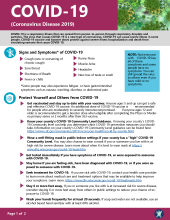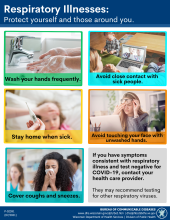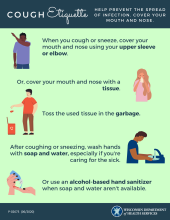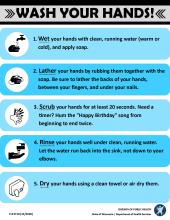COVID-19: Communication Resources
Below you will find COVID-19 communications resources.
Fact sheets
General COVID-19 information
Coronavirus disease, P-02592
Available in English, Chinese, Hindi, Hmong, Somali, and Spanish.
Respiratory illnesses: protect yourself and those around you, P-02591
Available in English, Chinese, Hmong, and Spanish.
Cough etiquette, P-02673
Available in English, Hindi, Hmong, Somali, and Spanish.
Wash your hands! P-01710
Available in English, Hindi, Hmong, Somali, and Spanish.
Additional resources
- Respiratory Illness Vaccine Promotion Toolkits. Toolkits regarding the importance and promotion of respiratory illness vaccination for:
- COVID Vaccine Facts has social media graphics and messages for all platforms. Check out the COVID-19 vaccine safety fact sheet and FAQs on their website.
- Public Health Communications Collaborative has a library of downloadable COVID-19 graphics and videos.
Tips and resources for your own communications
- The COVID-19 Vaccine Homepage has easy to read frequently asked questions, information about what to expect before and after COVID-19 vaccination, and resources for health care workers.
- Answer tough questions using the Public Health Communications Collaborative’s message guidance and framing.
- The Children's Hospital of Philadelphia answers frequently asked questions on their COVID-19 Vaccine Education Center website.
- Diagnose and address access and confidence challenges in your area. CDC (Centers for Disease Control and Prevention) has developed a Rapid Community Assessment Guide with customizable research instruments that can be adapted to different communities, including key informant interview guides, listening sessions, and a vaccine confidence survey.
- You can use the free Vaccine Equity Planner to identify useful partners or locations to hold vaccination clinics, easily taking into account distances to existing vaccination sites, varying social vulnerability, and people’s intentions to get vaccinated. This tool identifies COVID-19 “vaccine deserts,” where people have little or no convenient access to vaccination, and potential new vaccination sites to address the gaps.
You can view the Public Health Communication Collaborative’s resources and recorded webinars to gain deeper understanding of COVID-19 vaccine and public health communication.
Use the Public Health Communication Collaborative’s Misinformation Alerts to learn what misinformation is being shared in the moment and how to respond.
Other federal and state resources
State resources
- Wisconsin Medicaid Non-Emergency Medical Transportation
- Wisconsin Aging and Disability Resource Centers (ADRC)
- Wisconsin County and Tribal Aging Offices Services
- Wisconsin Association of Mobility Managers - COVID-19 Resources
- Northeast Wisconsin Regional Access to Transportation Committee
National and federal resources
- CDC’s Health Equity Guiding Principles for Inclusive Communication – Apply health equity guiding principles across your public health communication work, including when creating information resources and presentations, when engaging with partners, and/or when developing and reviewing external or internal communication materials. This means:
- Using a health equity lens when framing information about health disparities.
- Considering the guiding principles, such as using person-first language and avoiding unintentional blaming.
- Using preferred terms for select population groups while recognizing that there isn’t always agreement on these terms.
- Considering how communications are developed and looking for ways to develop more inclusive health communications products.
- Exploring other resources and references related to health equity communications.
- Public Health Alliance of Southern California – Checkout their video series on vaccine equity.
- Refugee Community Advisory Board - Milwaukee – Share educational COVID-19 videos with your audience. Many videos are available in multiple languages.
- National Resource Center for Refugees, Immigrants, and Migrants (NRC-RIM) – Fact sheets, posters, checklists, and other materials in more than 100 languages are available to support vaccine efforts among refugee, immigrant, and migrant communities.




